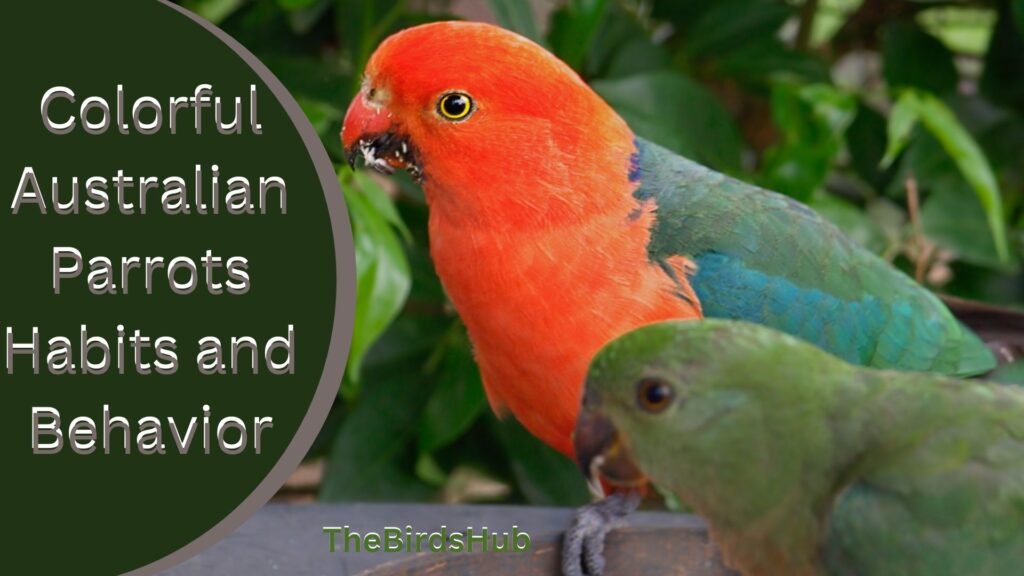Parrot Birds And Their lifestyle are some of the most captivating and charismatic creatures on the planet. Known for their vivid plumage and remarkable ability to mimic human speech, these birds have captured the hearts and imaginations of people for centuries. But there’s so much more to parrots than their pretty feathers and chatty nature! In this article, we’ll dive deep into the world of parrot birds, exploring their diverse species, unique behaviors, and what makes them such amazing pets.

Parrot Birds And Their lifestyle
Diversity of Species
Parrot Birds And Their lifestyle, belonging to the order Psittaciformes, encompass over 390 species, which are spread across a vast range of habitats, from tropical rainforests to arid regions. Here are a few of the most well-known species:
Macaws: These large, colorful birds are native to Central and South America. They are known for their long tails and vibrant plumage, macaws are stars of the parrot world.
Cockatoos: Recognized by their distinctive crests and curved beaks, cockatoos are native to Australia, Indonesia, and the Philippines. These are known for their affectionate nature and loud calls.
African Grays: These medium-sized parrots are renowned for their exceptional intelligence and ability to mimic human speech. They are native to the rainforests of West and Central Africa. African Grays are considered the best talkers in the bird world.
Budgerigars (Budgies): Small and colorful, budgies are among the most popular pet birds worldwide, native to Australia and are known for their playful personalities. If you wanna know more about them, just click here.
The Colorful Palette
One of the most striking features of parrot birds is their dazzling array of colors. From the bright blues and golds of macaws to the pastel hues of budgies, parrots are nature’s living rainbows. This vibrant plumage often plays a crucial role in their social interactions and mating rituals.
Remarkable Intelligence of Parrots
Talkative Companions
When you think of parrot birds and their lifestyle, the first thing that probably comes to mind is their ability to talk. Parrots have a unique vocal apparatus called the syrinx, which allows them to produce a wide range of sounds. Many parrots can understand context and use words meaningfully. African Grays are famous for their impressive vocabularies and ability to form simple sentences.
Problem Solvers Extraordinaire
Parrots are not just good talkers; but incredibly smart too. Studies have shown that parrots have cognitive abilities comparable to a human toddler. They can solve puzzles, use tools, and even exhibit behaviors that suggest they have a sense of humor. This intelligence makes them engaging pets, which also means they require plenty of mental stimulation to stay happy.
Living with Parrot Birds
Choosing the Right Parrot
Deciding to bring a parrot into your home is a big commitment. Different species have different needs, so you need to choose a bird that fits your lifestyle. Here are some factors to consider:
Size: Larger parrots like macaws and cockatoos need more space and sturdier cages.
Lifespan: Parrots can live for decades, with some species reaching 50 years or more. Make sure you’re ready for a long-term commitment.
Noise Level: Parrots can be very loud, especially larger species. Consider your tolerance for noise and the proximity of neighbors.
Social Needs: Parrot Birds And Their lifestyle are social creatures and need plenty of interaction. If you work long hours, you might want to consider a species that’s more independent.
Parrot Care 101
Taking care of a parrot birds involves more than just feeding and cleaning. Here are some key aspects of parrot care:
Diet: A balanced diet for a parrot includes pellets, fresh fruits, vegetables, and occasional seeds. Avoid giving them chocolate, avocado, and caffeine, as these can be toxic.
Enrichment: Provide plenty of toys, perches, and puzzles to keep your parrot mentally stimulated.
Social Interaction: Spend time with your parrot daily. They thrive on interaction and can become depressed or develop behavioral issues if neglected.
Health Care: Regular vet check-ups are essential. Be on the lookout for signs of illness, such as changes in behavior, appetite, or droppings.
Conclusion
Parrot birds are more than just pretty feathers and amusing chatterboxes. They are intelligent, social creatures that can bring immense joy and companionship to those who are willing to invest the time and effort required to care for them properly. Whether you’re a seasoned bird owner or considering bringing your first parrot home, understanding these remarkable birds’ needs and behaviors will help ensure a happy and healthy life for your feathered friend.
FAQs
Q: Can all parrot birds talk?
Not all parrots can talk, and those that do vary in their ability to mimic human speech. Species like African Greys and Amazon parrots are known for their exceptional talking skills, while others may only learn a few words or phrases.
Q:How long do Parrot Birds And Their lifestyle?
Parrots have varying lifespans depending on the species. Smaller parrots like budgies may live around 5-10 years, while larger species like macaws and cockatoos can live 50 years or more with proper care.
Q: Are parrot birds good pets for beginners?
While parrot birds can make wonderful pets, they require a significant amount of time, effort, and resources. Smaller species like budgies or cockatiels might be more suitable for beginners, but it’s crucial to do thorough research before bringing any parrot home.
Q: Do parrots need a companion?
Parrot birds and their lifestyle are highly social animals and often benefit from having a companion, whether it’s another bird or plenty of interaction with their human caretakers. However, introducing a new bird should be done carefully to ensure compatibility.
Q: How can I teach my parrot to talk?
Teaching a parrot to talk involves patience and repetition. Start with simple words and phrases, use positive reinforcement, and be consistent. Some parrots are natural talkers, while others may take longer to learn or may not talk at all.
Q: How can I tell if my parrot is happy?
A happy parrot will often display behaviors such as singing, playing with toys, socializing with you or other birds, and exhibiting bright, alert eyes. They may also engage in preening and have a relaxed posture with smooth, well-kept feathers.
Q: Why does my parrot pluck its feathers?
Feather plucking can be a sign of various issues, including boredom, stress, poor diet, lack of social interaction, or underlying health problems. It’s essential to identify the cause and address it promptly, often with the help of a veterinarian.
Q: How do I introduce a new parrot to my home?
When introducing a new parrot, start by placing the new bird’s cage in the same room as your current birds but at a distance. Gradually bring the cages closer over several days, allowing the birds to observe each other. Monitor their interactions closely and provide plenty of positive reinforcement.
Q: What kind of toys do parrots like?
Parrots enjoy a variety of toys, including:
Chew toys: Made from safe woods, leather, or natural fibers.
Foraging toys: Hide treats inside to stimulate their natural foraging instincts.
Puzzle toys: Encourage problem-solving and mental stimulation.
Swing and climbing toys: Provide physical exercise and fun.
Q: How often should I clean my parrot’s cage?
It’s essential to clean your parrot’s cage regularly to maintain a healthy environment. Spot clean daily by removing soiled papers, food debris, and droppings. Thoroughly clean and disinfect the cage, perches, and toys at least once a week.
Q: Can parrots recognize their owners?
Yes, parrots can recognize their owners and often form strong bonds with them. They may show recognition through vocalizations, seeking attention, and displaying affectionate behaviors like cuddling or preening their owners.
Q: Do parrots need a special light?
Parrots benefit from exposure to natural sunlight or full-spectrum lighting, which helps them synthesize vitamin D3, crucial for their bone health and overall well-being. Ensure they get at least a few hours of appropriate lighting each day.
Q: How can I socialize with a shy or nervous parrot?
Socializing a shy or nervous parrot takes patience and consistency. Spend time near their cage, speak softly, and offer treats to build trust. Gradually introduce handling, starting with gentle head scratches and progressing to more extended interactions as the bird becomes more comfortable.
Q: What should I do if my parrot escapes?
If your parrot escapes, remain calm and try to lure it back with familiar calls, treats, or a favorite toy. Notify neighbors and local animal shelters, and post on social media or community boards. Parrots often don’t venture far and may be found in nearby trees or rooftops.

